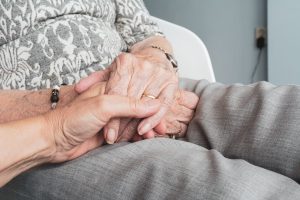Hair loss, a condition that can significantly impact a man’s self-esteem and quality of life, is increasingly becoming a common concern among men in the UK. Recent studies indicate that up to 50% of men will experience some form of hair loss by the age of 50, a statistic that underscores the prevalence of this issue.
While it’s a natural part of ageing for many, the emotional and psychological effects of hair loss can be profound. Understanding how to support your husband through this challenging time is crucial in helping him navigate the complexities of hair loss with confidence and positivity. This article aims to provide practical advice on how to offer support, explore treatment options, and maintain a positive outlook throughout the journey of dealing with hair loss.
Recognising the Psychological Impact
The psychological ramifications of hair loss in men are well-documented, with research highlighting increased risks of depression and anxiety. A study found that men experiencing early onset hair loss reported a higher incidence of body image dissatisfaction, directly correlating to lowered self-esteem.
Understanding these emotional challenges is the first step towards providing meaningful support. It’s essential to acknowledge his feelings, offering a listening ear and affirming his experiences without immediately jumping to solutions.
Exploring Evidence-Based Treatments
With advancements in medical science, there are now various evidence-based treatments available for managing hair loss. These range from topical treatments like minoxidil, proven to slow hair loss and stimulate regrowth in many cases, to oral medications such as finasteride that can prevent further hair thinning by blocking DHT, a hormone associated with male pattern baldness. The efficacy of these treatments varies, with studies indicating a success rate for 2 out of 3 men for minoxidil in promoting hair regrowth.
For those considering more permanent solutions, hair transplant surgery has evolved significantly, with success rates improving as techniques become more sophisticated. Initiating a dialogue about these options, perhaps by consulting resources, can demystify treatment pathways and encourage your husband to take proactive steps towards managing his hair loss.
Leveraging Support Groups and Resources
The journey through hair loss can feel isolating, but it doesn’t have to be. Engaging with support groups and online forums can provide a sense of community and belonging, offering a platform to share experiences and advice. Research indicates that social support can significantly impact one’s ability to cope with hair loss, improving mental health outcomes.
Additionally, educational resources and treatments, such as those provided by reputable sites like Oxford Online Pharmacy, can empower both you and your husband with information about the latest treatments and research findings, making the process of choosing a hair loss treatment plan less daunting.
Building a Support System
Creating an environment of support and understanding at home is crucial. This involves not only providing emotional support but also helping to research and evaluate treatment options together. Encouraging a holistic approach to health and well-being, including diet, exercise, and stress management, can also be beneficial. Studies have shown that stress is a significant factor in hair loss, which means that activities reducing stress might indirectly contribute to managing the condition.
Encouraging Professional Consultation
Encouraging your husband to seek professional advice can make a significant difference. A healthcare provider can offer a diagnosis, discuss potential underlying causes, and recommend tailored treatment plans.
This professional guidance is invaluable, not just for the physical aspects of hair loss but also for the psychological support a medical professional can provide. According to research, individuals who seek and receive treatment for hair loss often report higher levels of self-esteem and overall satisfaction with their appearance.
Addressing Lifestyle Factors
Lifestyle plays a significant role in overall hair health, and adjustments in this area can complement medical treatments for hair loss. Nutritional deficiencies, for example, are linked to hair thinning and loss. Ensuring a balanced diet rich in vitamins and minerals such as iron, vitamin D, and omega-3 fatty acids can support hair growth.
A study highlights the impact of nutritional factors on hair loss, suggesting that dietary improvements can help manage the condition. Encourage your husband to adopt a healthier lifestyle, including regular exercise, which can improve blood circulation to the scalp and promote hair growth, while also reducing stress levels, further mitigating hair loss.
Focusing on Non-Appearance Based Attributes
While navigating the challenges of hair loss, it’s vital to remind your husband of his value beyond physical appearance. Highlighting and celebrating his qualities, achievements, and the aspects of his personality that you admire can reinforce his sense of self-worth.
Studies have shown that individuals who perceive their self-worth as tied to their internal qualities rather than their external appearance are better at coping with the psychological impact of hair loss. Encouraging hobbies, interests, and activities that promote a sense of achievement and fulfilment can also help shift focus from appearance to personal growth and happiness.




